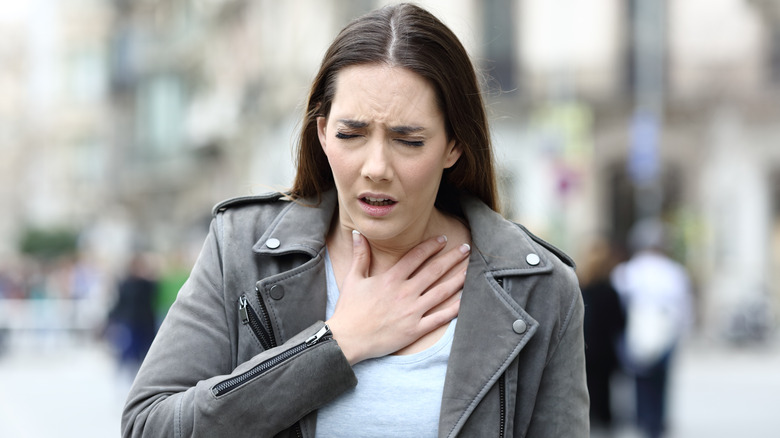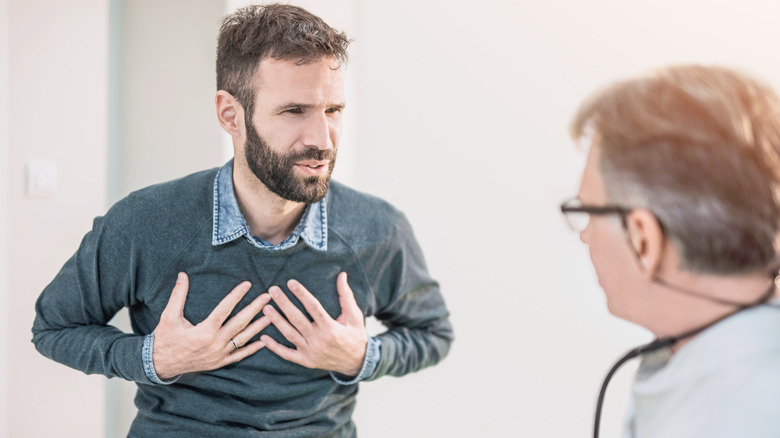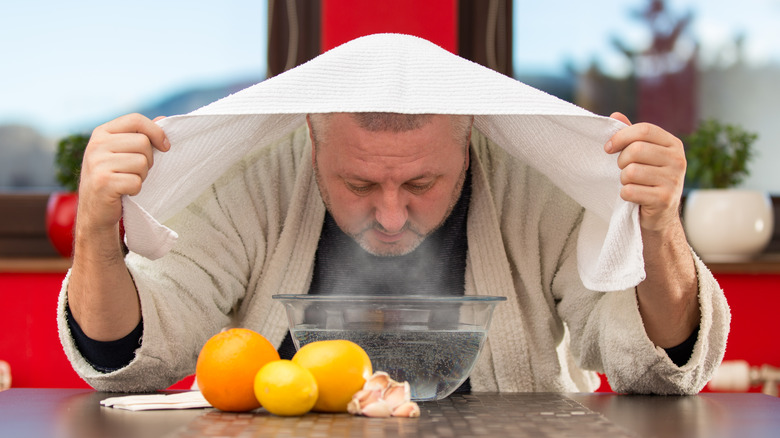Why You're Wheezing When Breathing (And When To Be Concerned)
Take a deep breath in, then listen as you exhale. Does it make a whistling or rattling sound?
No, this isn't ujjayi breathing that calms your mind. A wheezing cough is caused by something along your respiratory system becoming partially blocked. The sound will differ depending on where this blockage occurs. You'll hear a husky wheeze if you're experiencing an obstruction in your upper chest or throat. A higher-pitched tone indicates a blockage in your lower respiratory system (via Cleveland Clinic).
Many conditions can cause you to wheeze, according to the National Library of Medicine, including swelling and mucus in your lungs if you have a bad cold, an insect sting or bite, or if you're a person who smokes. Even people with gastrointestinal problems such as acid reflux disease could begin wheezing. Wheezing could also be caused by severe asthma. Although mild wheezing can be treated at home, there are less common causes that warrant seeing a doctor.
When to be concerned about your wheezing
Typically wheezing that comes with a cold or upper respiratory infection will go away when you start feeling better (per Houston Methodist Hospital). If you suddenly notice wheezing that isn't caused by allergies or asthma, your doctor might need to check your lungs particularly if it persists for a while. What also might be concerning is if you've had heavy wheezing and it suddenly stops. This could indicate a total blockage of the airflow in your lungs. A breathing test can determine if you have an obstruction in your airway.
You should head to the emergency room if your wheezing is accompanied by bluish skin or fingernails (via Cleveland Clinic). That's because whatever is obstructing your airflow is preventing oxygen from getting into your lungs. People who are allergic to bee stings might need to seek emergency care if they begin wheezing. An ER visit might also be necessary if you begin wheezing after eating (or choking on) certain foods or taking a new prescription medication.
Home care for wheezing
Mild cases of wheezing can be alleviated with a few treatments at home, according to Medical News Today. Adding a little moisture to your air can help open up your sinuses and lungs. You can do this by inhaling steam (be careful not to burn yourself) or running a humidifier in your home. Drinking hot beverages can also help clean out your air passages. If you notice you're wheezing only inside your home, using air purifiers can help remove any allergens that could trigger wheezing. It's also helpful to recognize any triggers to your wheezing and try to control your exposure to them.
Breathing exercises are not only good for anxiety, but they can also strengthen your lungs, as WebMD reported. The first is pursed-lip breathing. Start by breathing in deep through your nose, then slowly exhale through your mouth as if you're going to softly whistle. Deep belly breathing can also help. Inhale through your nose as you feel your diaphragm push out your abdomen. Exhale slowly, feeling your diaphragm and abdomen contract. With both methods of breath, aim for the exhales to be longer than the inhales.



